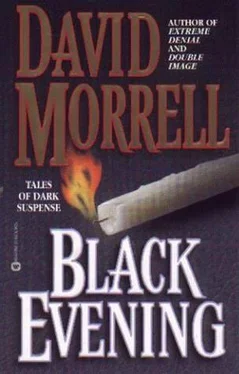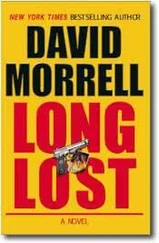David Morrell - Black Evening
Здесь есть возможность читать онлайн «David Morrell - Black Evening» весь текст электронной книги совершенно бесплатно (целиком полную версию без сокращений). В некоторых случаях можно слушать аудио, скачать через торрент в формате fb2 и присутствует краткое содержание. Жанр: Ужасы и Мистика, на английском языке. Описание произведения, (предисловие) а так же отзывы посетителей доступны на портале библиотеки ЛибКат.
- Название:Black Evening
- Автор:
- Жанр:
- Год:неизвестен
- ISBN:нет данных
- Рейтинг книги:4 / 5. Голосов: 1
-
Избранное:Добавить в избранное
- Отзывы:
-
Ваша оценка:
- 80
- 1
- 2
- 3
- 4
- 5
Black Evening: краткое содержание, описание и аннотация
Предлагаем к чтению аннотацию, описание, краткое содержание или предисловие (зависит от того, что написал сам автор книги «Black Evening»). Если вы не нашли необходимую информацию о книге — напишите в комментариях, мы постараемся отыскать её.
Black Evening — читать онлайн бесплатно полную книгу (весь текст) целиком
Ниже представлен текст книги, разбитый по страницам. Система сохранения места последней прочитанной страницы, позволяет с удобством читать онлайн бесплатно книгу «Black Evening», без необходимости каждый раз заново искать на чём Вы остановились. Поставьте закладку, и сможете в любой момент перейти на страницу, на которой закончили чтение.
Интервал:
Закладка:
But the former owner had long ago moved away.
Several other stops had been to Brian Roth's former hunting companions. Grady had hoped that one of them might be able to describe what had happened to Brian the day they'd taken him hunting in this area. He'd hoped that they might have an explanation for Brian's sudden determination to buy this land.
But none of them even remembered that afternoon.
Grady's final stop had been to his attorney. Ida Roth's lawyer had already been in touch with him. Ida was determined to contest the will and make sure that Grady didn't inherit the property. Grady was shocked to hear his attorney say that Brian had clearly not been in his right mind if he'd amended his will while contemplating suicide. Brian's own attorney apparently agreed. The consensus was that Grady would lose his fight against Ida. The compound would be denied to him.
So as Grady sat beside his wife and son, watching his eerily moonlit companions near the pool, he kept drinking and brooding and telling himself that he couldn't bear to be separated from his family again.
But what was the alternative?
Grady hugged Helen and John. "You might want to take a walk."
"We'll stay," Helen said. "So you won't be afraid."
"You're sure?"
"Yes. I don't want you to feel alone."
Grady kissed her, drank more bourbon, then unholstered his revolver.
He understood now why Brian and Betsy had made this choice. How lonely they must have felt, seeing their dead children and eventually their dead companions. In their presence but not truly with them.
Grady cocked his revolver. The final speck of his sanity told him, your wife and son aren't real, you know. The others aren't, either. This is all your imagination.
Maybe, Grady thought. Maybe not.
But even if it is my imagination, when Ida gets control of the compound, I'll never have the chance to see Helen and John again. Even if I only imagine them.
It was an agonizing dilemma.
It required more thought.
So with his wife and son beside him, Grady held his revolver in one hand while he drank from his bottle with the other. The alcohol made him sleepy. The specters were beginning to fade. He'd soon have to make a choice, and he wondered what it would be. As the stupor from the bourbon overwhelmed him, which would feel heavier? Would the bottle drop from his hand first? Or would the revolver?
Afterword
From "The Dripping" in 1972 to "The Shrine" twenty years later, these stories represent a significant portion of my life – and significant events along the way. The year the final story was published, I made a further significant choice by leaving Iowa City, where I had lived since 1970, and taking up residence in Santa Fe, New Mexico, in the summer of 1992.
My wife and I did it suddenly. Watching a segment of Public Broadcasting's This Old House that was devoted to Santa Fe 's distinctive adobe-pueblo style of architecture, we found the city of holy faith and its surrounding mountains so picturesque that we decided to spend a long weekend visiting there. It was my forty-ninth birthday. I had just finished a long novel, Assumed Identity. A little time off sounded good. But we weren't prepared for the impact that the mystical mountains and the high desert would have on us. In three days, we were looking at houses. On the fourth day, we selected one and flew back to Iowa City to make preparations to move. Three months later, we were living in Santa Fe.
Our decision had nothing to do with a change in our positive feelings about Iowa City. I had wonderful years at the university there. I made lifelong friends there. My wife and I raised a daughter and a son there. It's a special place, and it brought us happiness. But we also lost a son there, and sometimes it's necessary to get away from streets and buildings that cause painful memories.
Sometimes, too, a writer has to redefine himself or, as my wife put it, to start act three. In our new home, at an altitude of seven thousand feet, with wild flowers in front of our adobe house and piñon-treed mountains stretching off in every direction in what the locals call the land of enchantment, the land of the dancing sun, I began to look at things differently. For certain, the move affected my fiction, not just in the obvious way that I stopped writing about the midwest and switched my attention to New Mexico, using Santa Fe as a setting in several pieces.
A deeper change involved theme. The hero of one of my post-1992 novels, Extreme Denial , is a former intelligence operative who comes to Santa Fe to shut out his past and find himself. Substitute "former professor," and it's obvious that I was writing about me. From Matt's death in 1987 until our move to Santa Fe in 1992, I wrote more fiction about grief than I included here. But after settling in our new home, I wrote only one more on the subject, a novel called Desperate Measures in which an obituary writer whose son has died from cancer finds himself trapped in a conspiracy. Surviving, he comes to terms with his loss. In the latter respect, I was writing about myself.
Thus, while this collection doesn't include all my short fiction, it is complete inasmuch as it follows the progress of my imagination until the conclusion of act two when, after twenty-two years, I left Iowa City. Farther into act three, I'll prepare another collection and bring you up to date, sharing more memories with you. Meanwhile, I wasn't prepared for the emotional impact that grouping these stories together had on me. Pieces written years apart acquired new vividness for me when I read them in sequence over a couple of days. In particular, I was struck by how many of these stories are about threats to the main character's family. Philip Klass taught me to think of fiction writing as a form of self-psychoanalysis. "Write about what you most fear," he said. One day, my fear came true.
But I haven't lost my urge to tell stories, and that tells me other fears need to be expressed. The ferret keeps gnawing at my psyche. I persist in going after it.
Let me tell you a story.
Note
The stories in this collection were originally published in the following places:
"The Dripping," Ellery Queen's Mystery Magazine , August, 1972
"The Partnership," Alfred Hitchcock's Mystery Magazine , May, 1981
"Black Evening," Horrors , Playboy Press, ed. Charles L. Grant, 1981
"The Hidden Laughter," The Twilight Zone Magazine , August, 1981
"The Typewriter," The Dodd, Mead Gallery of Horror , Dodd, Mead, ed. Charles L. Grant, 1983
"A Trap For The Unwary" (author's note to "But At My Back I Always Hear"), Masters of Darkness III , Tor, ed. by Dennis Etchison, 1991
"But At My Back I Always Hear," Shadows 6 , Doubleday, ed. Charles L. Grant, 1983
"The Storm," Shadows 7, Doubleday, ed. Charles L. Grant, 1984
"For These And All My Sins," Whispers 5 , Doubleday, ed. Stuart L. Schiff, 1985
"Black And White And Red All Over," "Mumbo Jumbo," and "Dead Image," Night Visions II , Dark Harvest Press, ed. Charles L. Grant, 1985
" Orange Is For Anguish, Blue For Insanity," Prime Evil , New American Library, ed. Douglas L. Winter, 1989
"The Beautiful Uncut Hair of Graves," Final Shadows , Doubleday, ed. Charles L. Grant, 1991
"The Shrine," Dark At Heart , Dark Harvest Press, ed. Joe and Karen Lansdale, 1992
About the Author

My father was killed during World War II, shortly after I was born in 1943. My mother had difficulty raising me and at the same time holding a job, so she put me in an orphanage and later in a series of boarding homes. I grew up unsure of who I was, desperately in need of a father figure. Books and movies were my escape. Eventually I decided to be a writer and sought help from two men who became metaphorical fathers to me: Stirling Silliphant, the head writer for the classic TV series "Route 66" about two young men in a Corvette who travel America in search of themselves, and Philip Klass (whose pen name is William Tenn), a novelist who taught at the Pennsylvania State University where I went to graduate school from 1966 to 1970. The result of their influence is my 1972 novel, First Blood, which introduced Rambo. The search for a father is prominent in that book, as it is in later ones, most notably The Brotherhood of the Rose (1984), a thriller about orphans and spies. During this period, I was a professor of American literature at the University of Iowa. With two professions, I worked seven days a week until exhaustion forced me to make a painful choice and resign from the university in 1986. One year later, my fifteen-year-old son, Matthew, died from bone cancer, and thereafter my fiction tended to depict the search for a son, particularly in Fireflies (1988) and Desperate Measures (1994). To make a new start, my wife and I moved to the mountains and mystical light of Santa Fe, New Mexico, where my work changed yet again, exploring the passionate relationships between men and women, highlighting them against a background of action as in the newest, Burnt Sienna. To give his stories a realistic edge, he has been trained in wilderness survival, hostage negotiation, executive protection, antiterrorist driving, assuming identities, electronic surveillance, and weapons. A former professor of American literature at the University of Iowa, Morrell now lives in Santa Fe, New Mexico.
Читать дальшеИнтервал:
Закладка:
Похожие книги на «Black Evening»
Представляем Вашему вниманию похожие книги на «Black Evening» списком для выбора. Мы отобрали схожую по названию и смыслу литературу в надежде предоставить читателям больше вариантов отыскать новые, интересные, ещё непрочитанные произведения.
Обсуждение, отзывы о книге «Black Evening» и просто собственные мнения читателей. Оставьте ваши комментарии, напишите, что Вы думаете о произведении, его смысле или главных героях. Укажите что конкретно понравилось, а что нет, и почему Вы так считаете.












